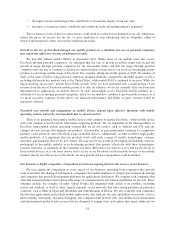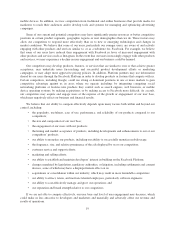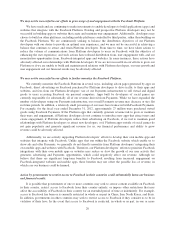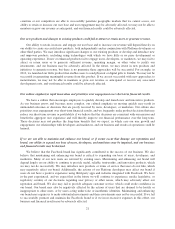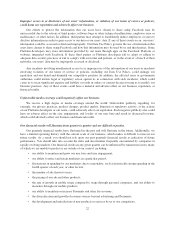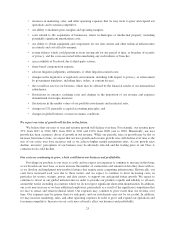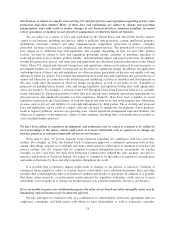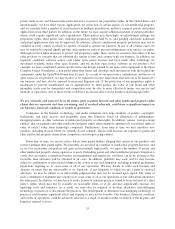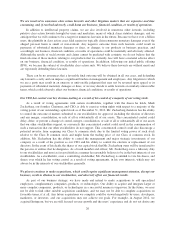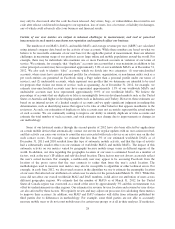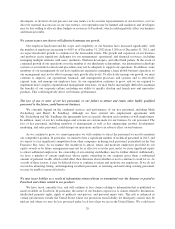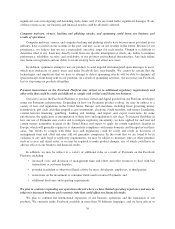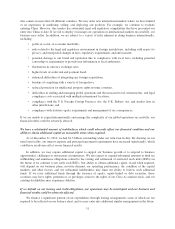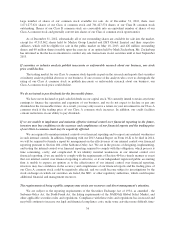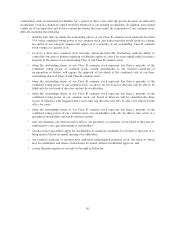Facebook 2012 Annual Report Download - page 31
Download and view the complete annual report
Please find page 31 of the 2012 Facebook annual report below. You can navigate through the pages in the report by either clicking on the pages listed below, or by using the keyword search tool below to find specific information within the annual report.direct revenue from Instagram. In addition, if we fail to successfully close or integrate any acquisitions, integrate
the products or technologies associated with such acquisitions into our company, or identify and address
liabilities associated with the acquired business or assets, our business, revenue, and operating results could be
adversely affected. Any integration process may require significant time and resources, and we may not be able
to manage the process successfully. We may not successfully evaluate or utilize the acquired products,
technology, or personnel, or accurately forecast the financial impact of an acquisition transaction, including
accounting charges. In addition, our ability to conduct due diligence with respect to acquisitions, and our ability
to evaluate the results of such due diligence, is dependent upon the accuracy and completeness of statements and
disclosures made or actions taken by the companies we acquire or their representatives. Despite our efforts, there
could be significant liabilities or deficiencies associated with the business, assets, products, financial condition or
accounting practices related to the assets or companies we acquire. In addition, we may have to pay cash, incur
debt, or issue equity securities to pay for acquisitions, any of which could adversely affect our financial results.
The sale of equity or issuance of debt to finance any such acquisitions could result in dilution to our stockholders.
The incurrence of indebtedness would result in increased fixed obligations and could also include covenants or
other restrictions that would impede our ability to manage our operations.
Our business is dependent on our ability to maintain and scale our technical infrastructure, and any
significant disruption in our service could damage our reputation, result in a potential loss of users and
engagement, and adversely affect our financial results.
Our reputation and ability to attract, retain, and serve our users is dependent upon the reliable performance of
Facebook and our underlying technical infrastructure. Our systems may not be adequately designed with the
necessary reliability and redundancy to avoid performance delays or outages that could be harmful to our business.
If Facebook is unavailable when users attempt to access it, or if it does not load as quickly as they expect, users may
not return to our website as often in the future, or at all. As our user base and the amount and types of information
shared on Facebook continue to grow, we will need an increasing amount of technical infrastructure, including
network capacity, and computing power, to continue to satisfy the needs of our users. It is possible that we may fail
to effectively scale and grow our technical infrastructure to accommodate these increased demands. In addition, our
business is subject to interruptions, delays, or failures resulting from earthquakes, adverse weather conditions, other
natural disasters, power loss, terrorism, or other catastrophic events.
A substantial portion of our network infrastructure is provided by third parties. Any disruption or failure in
the services we receive from these providers could harm our ability to handle existing or increased traffic and
could significantly harm our business. Any financial or other difficulties these providers face may adversely
affect our business, and we exercise little control over these providers, which increases our vulnerability to
problems with the services they provide.
We could experience unforeseen difficulties in building and operating key portions of our technical
infrastructure.
We have designed and built our own data centers and key portions of our technical infrastructure through
which we serve our products, and we plan to continue to significantly expand the size of our infrastructure
primarily through data centers and other projects. The infrastructure expansion we are undertaking is complex,
and unanticipated delays in the completion of these projects or availability of components may lead to increased
project costs, operational inefficiencies, or interruptions in the delivery or degradation of the quality of our
products. In addition, there may be issues related to this infrastructure that are not identified during the testing
phases of design and implementation, which may only become evident after we have started to fully utilize the
underlying equipment, that could further degrade the user experience or increase our costs.
Our software is highly technical, and if it contains undetected errors, our business could be adversely affected.
Our products incorporate software that is highly technical and complex. Our software has contained, and
may now or in the future contain, undetected errors, bugs, or vulnerabilities. Some errors in our software code
27



